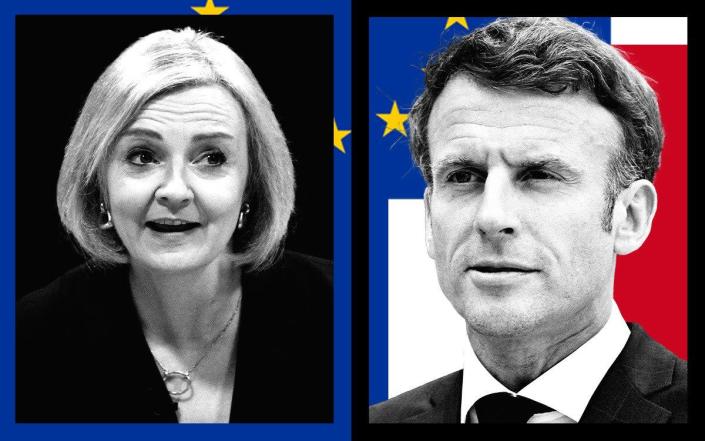
It is plainly daft to continue the phoney wars of Britain’s Brexit battles with France when a real conflict is being fought in Ukraine.
Liz Truss, the Prime Minister, must grasp the chance to reset Anglo-French relations when she meets French leader Emmanuel Macron on the margins of the UN General Assembly on Tuesday.
An unpredictable Russia is on the back foot. It is time to end any suggestion of division between the NATO allies, which are Europe’s two major military powers.
In recent years, London and Paris have clashed over Brexit, coronavirus vaccines, the Aukus submarine row and migrants crossing the Channel.
A nadir was reached when Royal Navy and French boats shadowed each other off the coast of Jersey during the 2021 dispute over fishing rights after Brexit.
Mr Macron, who regards former prime minister Boris Johnson as a populist liar, certainly played his part in the deterioration of relations to their worst in modern times.
It was his government that threatened to cut off Jersey’s energy supply in the row over post-Brexit fishing licences before April’s presidential elections.
Mr Macron won his second term and is now looking to rebuild broken bridges. Ms Truss has also won her election and should do the same.
The French president’s addresses to the British people after the death of Queen Elizabeth II have been sensitive and well-judged. He has underscored the “unbreakable” ties between the UK and France.
Mr Macron’s stance towards Russia has moved closer to Britain’s as it became clear his efforts of diplomacy towards Putin had failed.
After the discovery of mass graves in Russian-occupied Izyum last week, Mr Macron warned there could be “no peace without justice”.
France, like Britain, has bolstered Europe’s eastern flank with troops and sent arms to Ukraine.
Ms Truss will make her support for Ukraine the centrepiece of her speech to the UN. Mr Macron has said that the war in Ukraine and food and energy security would be “shared priorities” with Britain.
Mr Johnson’s defenestration makes the reset easier, despite Ms Truss’s unforced campaign trail error in suggesting the “jury’s out” on whether Mr Macron was a friend or foe to Britain.
There was talk of a high-profile Anglo-French summit with Mr Johnson, which is an idea Ms Truss should revive.
London is understandably wary of Mr Macron’s suggestion the UK could join his pet project of a European political community of EU and non-EU states. No one wants to join a shadow EU but improved relations are clearly desirable.
The problem remains, as ever, Brexit and the Northern Ireland Protocol.
For the ardently pro-EU Mr Macron, British threats to unilaterally renege on the Irish Sea border treaty are unacceptable and, if carried out, will demand retaliation.
Ms Truss wants leaders like Mr Macron to change the European Commission’s negotiating mandate to allow for a wholesale redrafting of the Brexit treaty.
There is little appetite for that in EU capitals at present, which may convince the Prime Minister she has no choice but to tear up the treaty with the Northern Ireland Protocol Bill.
The cautious reset in Anglo-French relations would not survive that.
Ms Truss is also meeting the president of the European Commission, which has responsibility for the talks, in New York and London and Brussels are signalling they are ready to negotiate.
Mr Macron and Ms Truss can draw a line under Brexit for now, and focus on what unites, rather than divides, them.




